As responsible pet owners, it is crucial to be mindful of the potential dangers lurking in everyday human foods that could harm our feline companions. By understanding the specific toxic substances that can pose a threat to cats, we can proactively protect their well-being and health.
The list of 15 human foods you should never feed your cat serves as a vital reminder of the importance of knowledge and vigilance when it comes to their diet. Stay tuned to uncover these hazardous foods and learn how to create a safer environment for your beloved feline friend.
Key Takeaways
- Chocolate, alcohol, and raw meat are toxic to cats.
- Avoid feeding cats citrus fruits, grapes, and xylitol.
- Keep cats away from bread dough, coffee, and certain vegetables.
- Consult a vet and prevent access to harmful human foods for cats.
Chocolate
Chocolate is a well-known human food that is toxic to cats and should never be consumed by them. This sweet treat contains theobromine and caffeine, which are harmful to felines.
Even small amounts of chocolate can cause vomiting, diarrhea, rapid breathing, increased heart rate, and seizures in cats. Dark chocolate and baking chocolate pose the highest risk due to their higher theobromine content.
It is crucial to keep all chocolate products, including cocoa powder and chocolate bars, out of reach of cats. If you suspect your cat has ingested chocolate, contact a veterinarian immediately. Prompt action can help prevent serious health complications and ensure the well-being of your feline companion.
Alcohol
Alcohol is another human substance that poses severe toxicity risks to cats and should be strictly avoided in their diet. Cats are highly sensitive to alcohol, and even small amounts can lead to serious health issues such as vomiting, diarrhea, difficulty breathing, tremors, and even coma. It is crucial to ensure that cats do not have access to any alcoholic beverages or foods containing alcohol. If you suspect that your cat has ingested alcohol, immediate veterinary attention is necessary to prevent further complications. Here is a table highlighting some common sources of alcohol that should be kept away from cats:
| Alcoholic Beverages | Food Items with Alcohol | Household Products |
|---|---|---|
| Wine | Desserts with alcohol | Cleaning products |
| Beer | Sauces with alcohol | Perfumes |
| Liquor | Chocolates with alcohol | Hand sanitizers |
Grapes
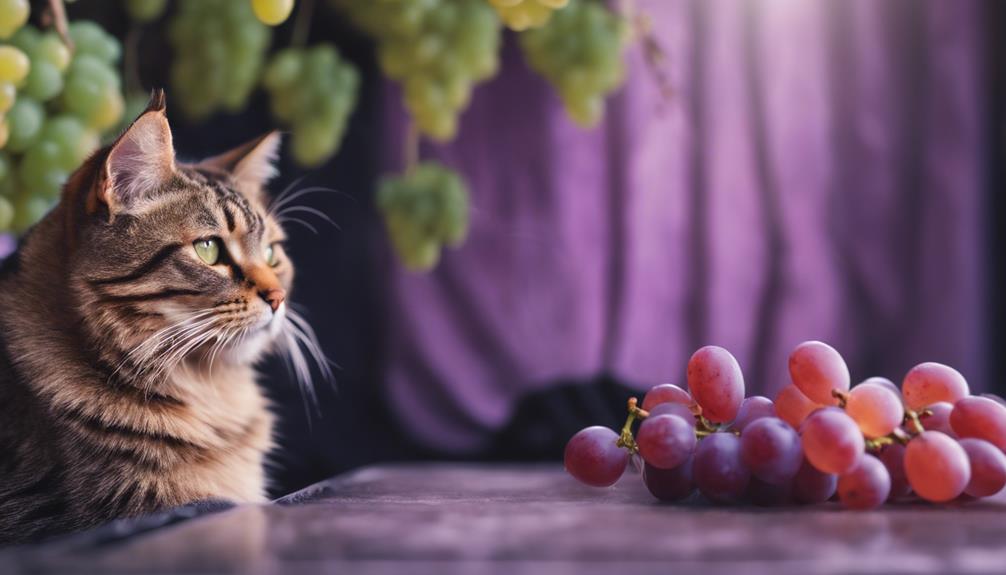
Grapes are known to be toxic to cats and should be strictly avoided in their diet due to the potential health risks they pose. Cats lack the necessary enzymes to digest certain compounds in grapes, leading to severe consequences if ingested.
- Symptoms of Grape Toxicity in Cats:
- Vomiting
- Diarrhea
- Kidney failure
It's crucial to be vigilant about keeping grapes out of reach of your feline companions to prevent accidental ingestion. If you suspect your cat has consumed grapes or shows any signs of toxicity, contact your veterinarian immediately for guidance and treatment. Your quick action can make a significant difference in your cat's health and well-being.
Raisins
Raisins, like grapes, present a significant health risk to cats and should be strictly avoided in their diet due to their potential toxicity. These dried fruits can lead to severe complications in cats, including kidney failure. It's crucial for cat owners to be aware of the dangers of feeding raisins to their feline companions. To help you understand the risks associated with feeding raisins to cats, here is a comparison table:
| Raisins | Impact on Cats |
|---|---|
| Toxicity | Can cause kidney failure |
| Symptoms | Vomiting, diarrhea, lethargy |
| Treatment | Contact a vet immediately |
Being cautious about what your cat consumes is essential for their well-being. If you suspect your cat has ingested raisins, seek veterinary attention promptly.
Onions
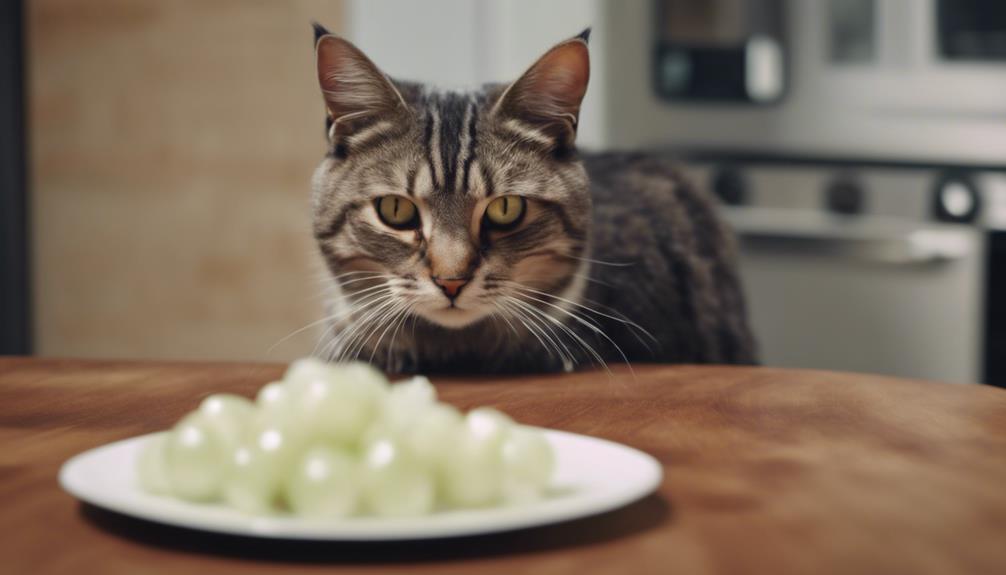
Caution must be exercised when considering the inclusion of onions in a cat's diet due to their potential toxicity to felines. Onions contain compounds that can cause damage to a cat's red blood cells, leading to a condition called hemolytic anemia. It's essential to keep onions away from cats to prevent any adverse effects.
- Onions can cause gastrointestinal upset in cats.
- The ingestion of onions may lead to symptoms such as weakness and lethargy.
- In severe cases, onion toxicity can result in organ damage or even death.
Garlic
Garlic, a commonly used ingredient in many human dishes, poses a significant risk to cats due to its potential toxicity. Cats are extremely sensitive to garlic, even more so than onions. Garlic contains compounds that can damage a cat's red blood cells, leading to a condition called hemolytic anemia. Just a small amount of garlic can have severe effects on a cat's health. It is crucial to keep all dishes containing garlic away from cats and to be cautious about any foods that may contain garlic powder or seasoning. Below is a table summarizing the dangers of garlic for cats:
| Dangers of Garlic for Cats | ||
|---|---|---|
| – Causes hemolytic anemia | – Damages red blood cells | – Even small amounts are toxic |
Xylitol
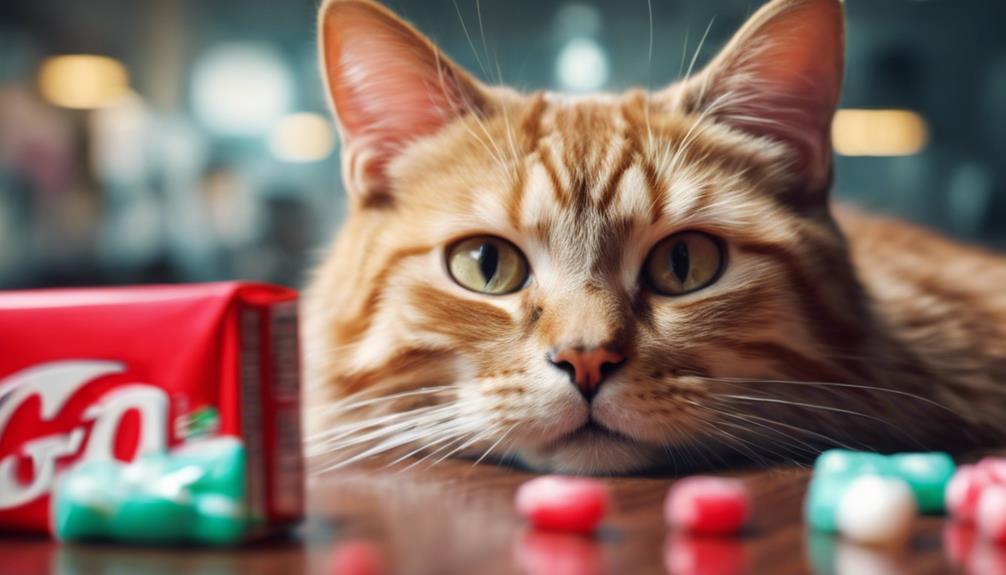
When considering potential risks associated with human foods for cats, xylitol emerges as a particularly hazardous ingredient due to its toxic effects on felines. Xylitol, a sugar substitute commonly found in sugar-free gum and some peanut butter brands, can be extremely harmful to cats.
- Xylitol consumption can lead to a rapid release of insulin in cats, causing a dangerous drop in blood sugar levels.
- Ingestion of xylitol can result in symptoms such as vomiting, lethargy, and coordination problems in cats.
- Even small amounts of xylitol can be toxic to cats, so it is crucial to keep products containing xylitol out of their reach to prevent accidental ingestion.
Coffee
Coffee poses a significant risk to cats due to its toxic effects when ingested. Even small amounts of coffee can cause serious harm to our feline friends. The caffeine in coffee can lead to symptoms like restlessness, rapid breathing, heart palpitations, muscle tremors, and even seizures in cats. To keep your cat safe, it's crucial to prevent any access to coffee and ensure it's stored securely away from their reach. Here is a breakdown of why coffee is harmful to cats:
| Toxic Component | Effects on Cats | Symptoms |
|---|---|---|
| Caffeine | Central Nervous System Stimulation | Restlessness, Rapid Breathing |
| Increased Heart Rate | Heart Palpitations | |
| Muscle Tremors | Seizures |
Raw Eggs
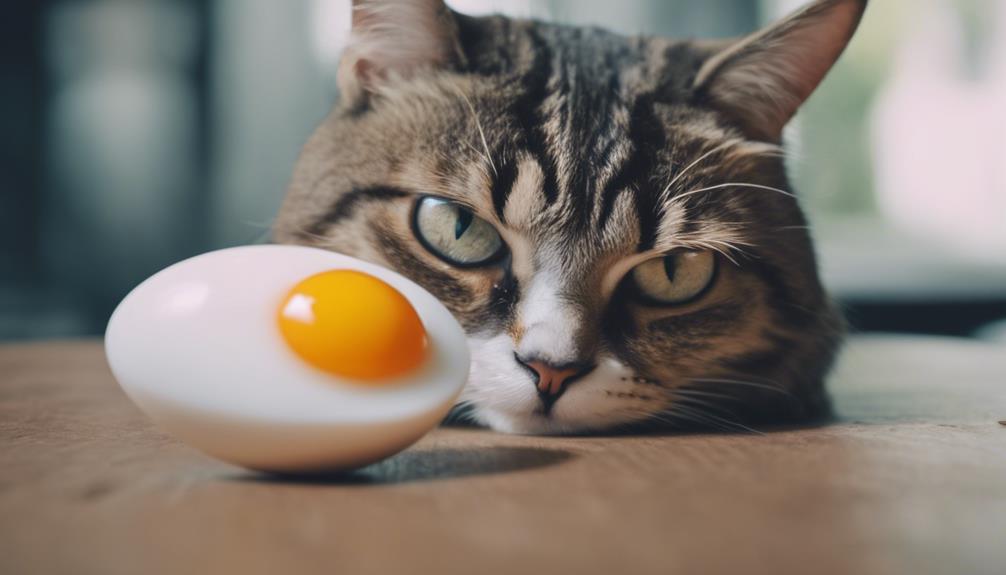
Raw eggs pose a potential danger to cats due to the risks associated with consuming them, warranting caution in their inclusion in a feline's diet.
- Salmonella Risk: Raw eggs can contain harmful bacteria like Salmonella, which can cause food poisoning and gastrointestinal issues in cats.
- Biotin Deficiency: Raw egg whites contain avidin, which can bind to biotin and lead to a biotin deficiency in cats if consumed in large quantities.
- Digestive Upset: Eating raw eggs can also result in digestive upset for some cats, leading to symptoms like vomiting and diarrhea.
It's crucial to cook eggs thoroughly before offering them to your feline friend to mitigate these risks and ensure their well-being.
Raw Meat
Consumption of raw meat by cats can pose significant health risks and should be approached with caution due to potential bacterial contamination and nutritional concerns.
Raw meat may contain harmful bacteria such as E. coli and Salmonella, which can lead to gastrointestinal issues and even more severe illnesses in cats. Additionally, raw meat alone may not provide a balanced diet for cats, lacking essential nutrients that are necessary for their well-being.
Cooking meat helps eliminate harmful bacteria and makes it easier for cats to digest, reducing the risk of foodborne illnesses. It is important to consult with a veterinarian before incorporating any raw meat into a cat's diet to ensure their nutritional needs are being met effectively.
Raw Fish
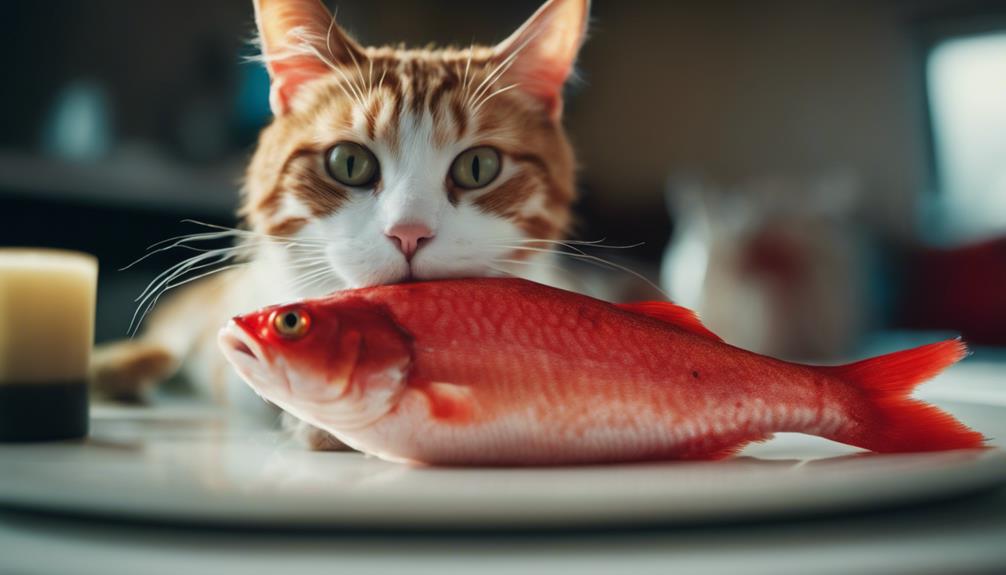
In considering the potential risks associated with raw meat consumption for cats, it is important to also address the concerns related to feeding cats raw fish.
- Raw fish can contain harmful bacteria and parasites that may lead to foodborne illnesses in cats.
- Raw fish lacks essential nutrients that are necessary for a cat's balanced diet.
- Thiaminase, an enzyme found in raw fish, can break down thiamine, causing a deficiency that can be detrimental to a cat's health.
Dairy Products
When considering the inclusion of dairy products in a cat's diet, it is essential to be aware of potential risks and benefits associated with their consumption.
While many cats enjoy the taste of dairy, most adult cats are lactose intolerant, lacking the necessary enzyme to digest lactose properly. Feeding dairy products to cats can lead to digestive issues such as stomach upset, diarrhea, and bloating.
It is best to avoid offering cats milk, cheese, or other dairy items as treats. Instead, focus on providing a well-balanced commercial cat food that meets all their nutritional needs.
Consulting a veterinarian before introducing any new foods to your cat's diet is always recommended to ensure their health and well-being.
Macadamia Nuts
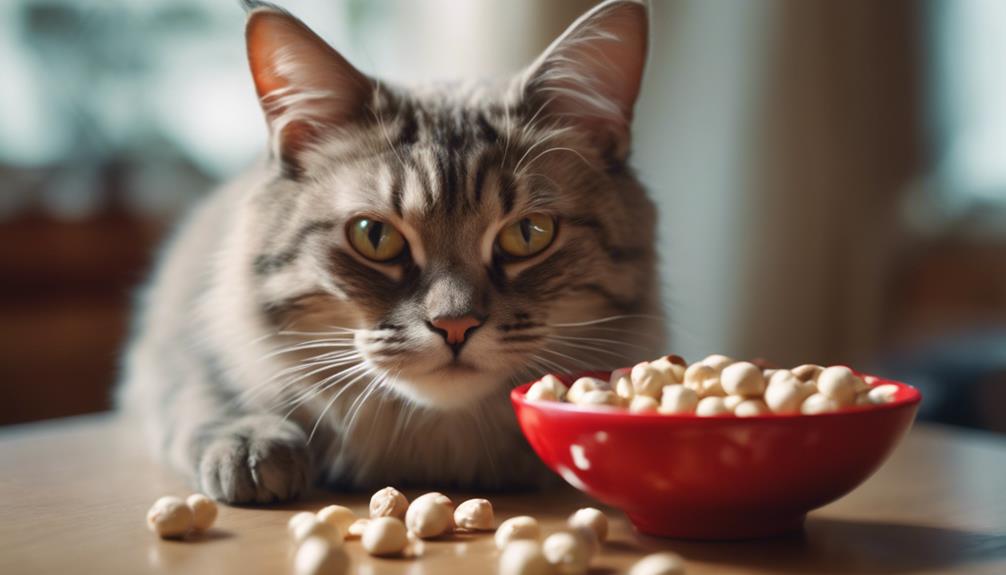
Macadamia nuts pose a significant threat to cats and should never be included in their diet due to their toxic effects. Cats are highly sensitive to macadamia nuts, and even a small amount can lead to severe health issues.
- Symptoms of Toxicity
- Weakness and lethargy
- Vomiting and tremors
- Elevated body temperature
These symptoms can indicate macadamia nut poisoning in cats. If you suspect your cat has ingested macadamia nuts, it is crucial to seek immediate veterinary care. Remember to always keep these nuts out of reach of your feline companion to prevent any accidental ingestion and potential harm.
Yeast Dough
The ingestion of yeast dough can pose a serious health risk to cats due to its potential toxicity. When cats consume yeast dough, the raw dough can expand in their stomachs, causing bloating and potential obstruction in the digestive tract.
The fermenting yeast produces alcohol as a byproduct, leading to alcohol poisoning in cats. Symptoms may include disorientation, lethargy, vomiting, and even seizures.
It's crucial to keep yeast dough out of reach of cats and never allow them to ingest it. If you suspect your cat has consumed yeast dough, seek immediate veterinary attention to prevent serious health complications.
Being mindful of what your cat has access to can help maintain their well-being and prevent unnecessary health issues.
Conclusion
In conclusion, it is imperative to steer clear of feeding your feline friends toxic human foods such as chocolate, alcohol, grapes, and onions. By avoiding these harmful substances, you can protect your cat's health and well-being.
Remember, when it comes to their diet, knowledge is power. Stay informed and vigilant to ensure a safe and nurturing environment for your beloved pets.
After all, a well-fed cat is a happy cat – and a healthy one too!




